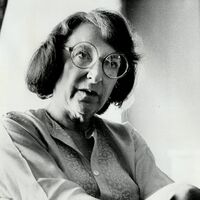Pauline Kael: Difference between revisions
No edit summary |
No edit summary |
||
| Line 1: | Line 1: | ||
[[File:Pauline Kael.jpg | 200px | right | thumb |Pauline Kael]] | |||
==Relevance== | ==Relevance== | ||
One of Morrissey's favourite 'symbolists' - via NME interview (1983):<br> | One of Morrissey's favourite 'symbolists' - via NME interview (1983):<br> | ||
Latest revision as of 07:00, 3 May 2023
Relevance
One of Morrissey's favourite 'symbolists' - via NME interview (1983):
[Morrissey - "Portrait Of The Artist As A Consumer"]
Mentioned In
Wikipedia Information
 |
Pauline Kael (; June 19, 1919 – September 3, 2001) was an American film critic who wrote for The New Yorker from 1968 to 1991. Known for her "witty, biting, highly opinionated and sharply focused" reviews, Kael often defied the consensus of her contemporaries. One of the most influential American film critics of her era, she left a lasting impression on the art form. Roger Ebert argued in an obituary that Kael "had a more positive influence on the climate for film in America than any other single person over the last three decades". Kael, he said, "had no theory, no rules, no guidelines, no objective standards. You couldn't apply her 'approach' to a film. With her it was all personal." In a blurb for The Age of Movies, a collection of her writings for the Library of America, Ebert wrote that "Like George Bernard Shaw, she wrote reviews that will be read for their style, humor and energy long after some of their subjects have been forgotten." For American readers, she brought attention to international cinema, and championed New Hollywood directors. Sanford Schwartz writes that, in the 1960s, she "gave a breathing, texture life to the aims and sensibilities of Ingmar Bergman, Jean-Luc Godard, Federico Fellini, Satyajit Ray, Akira Kurosawa, François Truffaut, and Michelangelo Antonioni, among other European and Asian directors; and she endowed Robert Altman, Martin Scorsese, Paul Mazursky, Brian De Palma, and Francis Ford Coppola, among American directors of the following decade, with the same full-bodied presence. [...] Her deepest subject, in the end, isn't movies at all—it's how to live more intensely."
